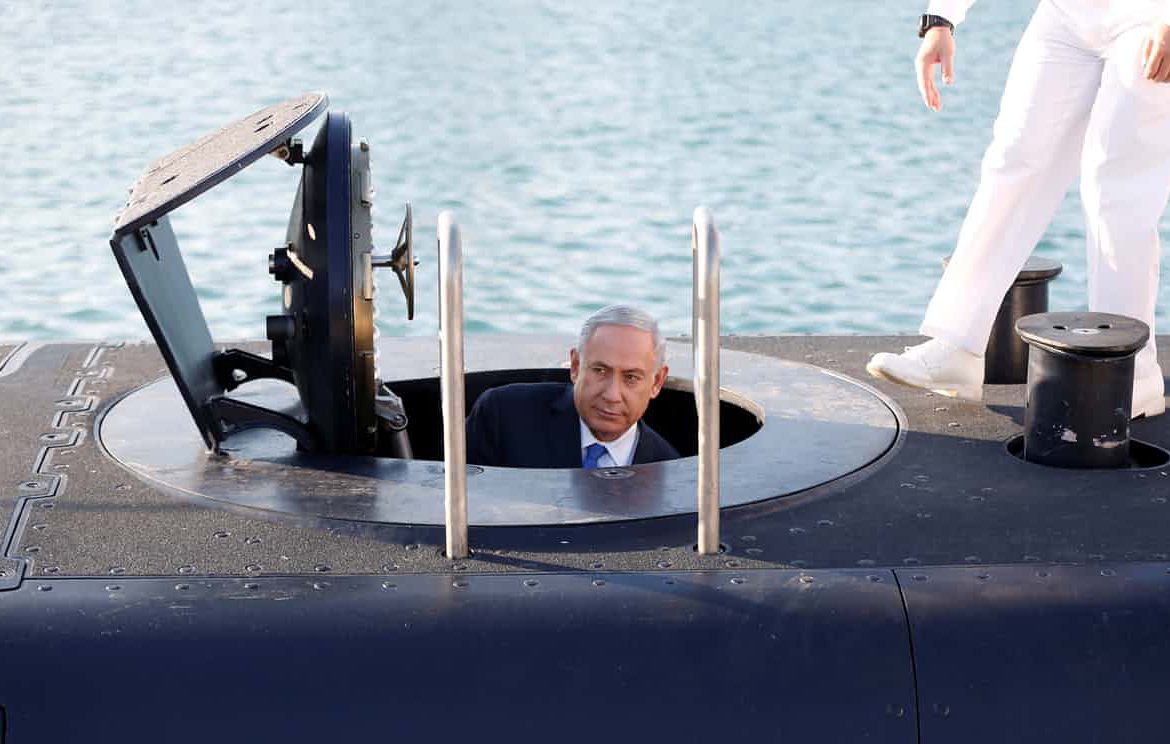This material belongs to: The Guardian.
Israeli police identify David Shimron, a cousin of the prime minister, after he was arrested with shipyard agent Mickey Ganor. Israeli police investigating allegations of corruption in a $2bn deal with Germany to buy submarines and naval patrol craft have arrested the prime minister’s personal lawyer as well as several other of his associates.
David Shimron, Benjamin Netanyahu’s lawyer and cousin, was identified by police after being arrested with Mickey Ganor, who acted as an agent for the German ThyssenKrupp shipyard in the deal.
Other individuals who have been questioned by police include Netanyahu’s former pick for his national security adviser and a senior naval commander. German authorities also are looking into the deal. Netanyahu has not been accused of any wrongdoing.
In June, the German magazine Der Spiegel reported that Germany’s national security council had approved the sale of the three nuclear-capable submarines to Israel and that authorities inserted a clause into the contract giving it the right to void it if corruption allegations were proven.
Shimron, who is under house arrest, also acts as the lawyer for Ganor, who was arrested on Monday on suspicion of bribery, money laundering, fraud and conspiracy. Shimron has denied any wrongdoing and has said he never discussed the deal with the prime minister so as to avoid any conflict of interest. Netanyahu has given his full backing to his lawyer.
Ganor has previously denied claims in the media linking him to Shimron, saying “there’s no connection between the report[s] and reality.” Ganor is still in police detention.
The investigation into the submarine deal – known in Israel as Case 3,000 – is one of a series of investigations into Netanyahu and his closest circle which has gripped Israel in recent months.
Israel’s Justice Ministry said in February that Netanyahu himself was not a suspect in the investigation into the 2016 contract for ThyssenKrupp to build three submarines and a 2015 agreement with the company to purchase four patrol vessels for Israel’s navy, but the proximity of the individuals involved to Netanyahu is politically problematic.
At the centre of the investigation are police suspicions that Shimron lobbied Israeli defence officials on behalf of ThyssenKrupp and Ganor for the deal.
While Netanyahu has denied any knowledge of his cousin’s involvement, he has been drawn, however, into a parallel political scandal following allegations by his former defence minister Moshe Ya’alon.
Ya’alon, who has publicly feuded with Netanyahu since his departure, has accused the prime minister of going behind his back to buy more submarines than the Israeli defence establishment believed were necessary, a claim rejected by Avigdor Lieberman, Ya’alon’s successor as defence minister.
Ya’alon – who has already given his own witness statement to police in the affair – last month threatened to go public with what he said was his own knowledge of wrongdoing by senior political figures in the deal.
Although polls suggest that Netanyahu and his Likud party remain the most popular among Israelis, his legal woes have increasingly come to the foreground including in two separate cases where Netanyahu is being investigated as a potential suspect. Those include Case 1000, where police are investigating allegations that a number of very wealthy businessmen gave expensive gifts to Netanyahu and his wife, Sara, over his years in office.
A separate investigation, known as Case 2000, is examining whether Netanyahu behaved inappropriately when he allegedly offered the publisher of Israel’s biggest-selling daily, Yedioth Ahronoth, his help in reducing the readership of the paper’s pro-Netanyahu rival Israel Hayom in exchange for more favourable coverage.
Netanyahu has repeatedly denied any wrongdoing in any of the cases, describing them as “baseless”. The investigation – and its handling by Israel’s attorney general, Avichai Mandelblit – has, however, become a focus of weekly demonstrations near Mandelblit’s home by people complaining about the slow progress of the investigations.


